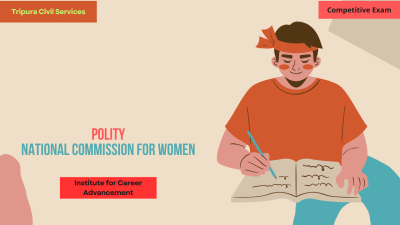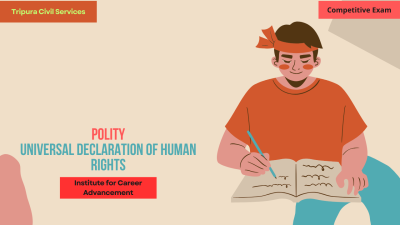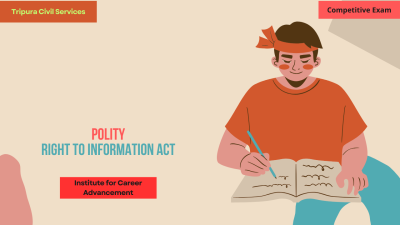Courses


 Compare
Compare
The Election Commission of India (ECI) is an autonomous constitutional authority responsible for administering and overseeing elections in India. Established under Article 324 of the Indian Constitution, the Election Commission ensures that elections to the Lok Sabha (House of the People), Rajya Sabha (Council of States), State Legislative Assemblies, and Presidential elections are conducted fairly, transparently, and efficiently. The Election Commission is tasked with overseeing the preparation of electoral rolls, conducting elections, and ensuring the implementation of the Representation of the People Act and other electoral laws. It also handles matters related to political party registration, election campaign finance, and the enforcement of the model code of conduct during elections. The commission comprises three members: a Chief Election Commissioner and two Election Commissioners, appointed by the President of India. It plays a crucial role in upholding the democratic process and ensuring free and fair elections across the country. ভারতের নির্বাচন কমিশন (ই. সি. আই) একটি স্বায়ত্তশাসিত সাংবিধানিক কর্তৃপক্ষ যা ভারতে নির্বাচন পরিচালনা ও তদারকির জন্য দায়বদ্ধ। ভারতীয় সংবিধানের 324 অনুচ্ছেদের অধীনে প্রতিষ্ঠিত, নির্বাচন কমিশন নিশ্চিত করে যে লোকসভা (লোকসভা), রাজ্যসভা (রাজ্য পরিষদ), রাজ্য বিধানসভা এবং রাষ্ট্রপতি নির্বাচন সুষ্ঠু, স্বচ্ছ এবং দক্ষতার সাথে পরিচালিত হয়। নির্বাচন কমিশনকে ভোটার তালিকা প্রস্তুতকরণ, নির্বাচন পরিচালনা এবং জনগণের প্রতিনিধিত্ব আইন ও অন্যান্য নির্বাচনী আইনের বাস্তবায়ন নিশ্চিত করার দায়িত্ব দেওয়া হয়েছে। এটি রাজনৈতিক দলের নিবন্ধন, নির্বাচনী প্রচারের অর্থায়ন এবং নির্বাচনের সময় আদর্শ আচরণবিধি প্রয়োগ সম্পর্কিত বিষয়গুলিও পরিচালনা করে। এই কমিশনে তিনজন সদস্য রয়েছেনঃ একজন প্রধান নির্বাচন কমিশনার এবং দুজন নির্বাচন কমিশনার, যাঁকে ভারতের রাষ্ট্রপতি নিয়োগ করেন। এটি গণতান্ত্রিক প্রক্রিয়া বজায় রাখতে এবং সারা দেশে অবাধ ও সুষ্ঠু নির্বাচন নিশ্চিত করতে গুরুত্বপূর্ণ ভূমিকা পালন করে।
0 Lessons
Hours

 Compare
Compare
The Election Commission of India (ECI) is an autonomous constitutional authority responsible for administering and overseeing elections in India. Established under Article 324 of the Indian Constitution, the Election Commission ensures that elections to the Lok Sabha (House of the People), Rajya Sabha (Council of States), State Legislative Assemblies, and Presidential elections are conducted fairly, transparently, and efficiently. The Election Commission is tasked with overseeing the preparation of electoral rolls, conducting elections, and ensuring the implementation of the Representation of the People Act and other electoral laws. It also handles matters related to political party registration, election campaign finance, and the enforcement of the model code of conduct during elections. The commission comprises three members: a Chief Election Commissioner and two Election Commissioners, appointed by the President of India. It plays a crucial role in upholding the democratic process and ensuring free and fair elections across the country. ভারতের নির্বাচন কমিশন (ই. সি. আই) একটি স্বায়ত্তশাসিত সাংবিধানিক কর্তৃপক্ষ যা ভারতে নির্বাচন পরিচালনা ও তদারকির জন্য দায়বদ্ধ। ভারতীয় সংবিধানের 324 অনুচ্ছেদের অধীনে প্রতিষ্ঠিত, নির্বাচন কমিশন নিশ্চিত করে যে লোকসভা (লোকসভা), রাজ্যসভা (রাজ্য পরিষদ), রাজ্য বিধানসভা এবং রাষ্ট্রপতি নির্বাচন সুষ্ঠু, স্বচ্ছ এবং দক্ষতার সাথে পরিচালিত হয়। নির্বাচন কমিশনকে ভোটার তালিকা প্রস্তুতকরণ, নির্বাচন পরিচালনা এবং জনগণের প্রতিনিধিত্ব আইন ও অন্যান্য নির্বাচনী আইনের বাস্তবায়ন নিশ্চিত করার দায়িত্ব দেওয়া হয়েছে। এটি রাজনৈতিক দলের নিবন্ধন, নির্বাচনী প্রচারের অর্থায়ন এবং নির্বাচনের সময় আদর্শ আচরণবিধি প্রয়োগ সম্পর্কিত বিষয়গুলিও পরিচালনা করে। এই কমিশনে তিনজন সদস্য রয়েছেনঃ একজন প্রধান নির্বাচন কমিশনার এবং দুজন নির্বাচন কমিশনার, যাঁকে ভারতের রাষ্ট্রপতি নিয়োগ করেন। এটি গণতান্ত্রিক প্রক্রিয়া বজায় রাখতে এবং সারা দেশে অবাধ ও সুষ্ঠু নির্বাচন নিশ্চিত করতে গুরুত্বপূর্ণ ভূমিকা পালন করে।
0 Lessons
Hours

 Compare
Compare
Part XIV of the Indian Constitution deals with the "Services under the Union and the States". It outlines the structure, powers, and functions of the Public Services in India, specifying the rules for the recruitment, conditions of service, and the responsibilities of civil servants. Key Features: Article 308 to 323: These articles establish the framework for services under the Union and States, detailing the creation of public services, the Union Public Service Commission (UPSC), State Public Service Commissions (SPSCs), and the roles of these bodies in recruitment and advisory functions. Union Public Service Commission (UPSC): Article 315-323 provides for the formation of UPSC and its role in advising the President on matters related to recruitment, promotions, and other services-related issues at the Union level. State Public Service Commissions: Similar provisions are made for each state to form its own Public Service Commission to manage recruitment and service matters at the state level. Independence of Public Service Commissions: These bodies are designed to function independently, free from political interference, ensuring fairness in the selection and promotion of government officials. Part XIV plays a crucial role in maintaining the integrity, efficiency, and impartiality of India’s civil services and ensuring that the functioning of the government is based on principles of merit and fairness. ভারতীয় সংবিধানের চতুর্দশ অংশে "ইউনিয়ন ও রাজ্যগুলির অধীনে পরিষেবা" নিয়ে আলোচনা করা হয়েছে। এটি ভারতে সরকারি পরিষেবার কাঠামো, ক্ষমতা এবং কার্যাবলীর রূপরেখা তৈরি করে, নিয়োগের নিয়ম, পরিষেবার শর্তাবলী এবং সরকারি কর্মচারীদের দায়িত্বগুলি নির্দিষ্ট করে। মূল বৈশিষ্ট্যঃ অনুচ্ছেদ 308 থেকে 323: এই নিবন্ধগুলি ইউনিয়ন এবং রাজ্যগুলির অধীনে পরিষেবাগুলির জন্য কাঠামো প্রতিষ্ঠা করে, পাবলিক সার্ভিস, ইউনিয়ন পাবলিক সার্ভিস কমিশন (ইউপিএসসি) রাজ্য পাবলিক সার্ভিস কমিশন (এসপিএসসি) এবং নিয়োগ ও উপদেষ্টা কার্যক্রমে এই সংস্থাগুলির ভূমিকার বিশদ বিবরণ দেয়। ইউনিয়ন পাবলিক সার্ভিস কমিশন (ইউপিএসসি) অনুচ্ছেদ 315-323 ইউপিএসসি গঠন এবং ইউনিয়ন পর্যায়ে নিয়োগ, পদোন্নতি এবং অন্যান্য পরিষেবা সম্পর্কিত বিষয়ে রাষ্ট্রপতিকে পরামর্শ দেওয়ার জন্য এর ভূমিকা প্রদান করে। রাজ্য পাবলিক সার্ভিস কমিশনঃ রাজ্য পর্যায়ে নিয়োগ ও পরিষেবা সংক্রান্ত বিষয়গুলি পরিচালনার জন্য প্রতিটি রাজ্যের নিজস্ব পাবলিক সার্ভিস কমিশন গঠনের জন্য একই ধরনের বিধান করা হয়েছে। পাবলিক সার্ভিস কমিশনগুলির স্বাধীনতাঃ এই সংস্থাগুলি স্বাধীনভাবে, রাজনৈতিক হস্তক্ষেপ থেকে মুক্ত, সরকারী কর্মকর্তাদের নির্বাচন ও পদোন্নতির ক্ষেত্রে ন্যায্যতা নিশ্চিত করার জন্য তৈরি করা হয়েছে। চতুর্থ অংশটি ভারতের সিভিল সার্ভিসের সততা, দক্ষতা এবং নিরপেক্ষতা বজায় রাখতে এবং সরকারের কার্যকারিতা যোগ্যতা ও ন্যায্যতার নীতির উপর ভিত্তি করে নিশ্চিত করতে গুরুত্বপূর্ণ ভূমিকা পালন করে।
0 Lessons
Hours

 Compare
Compare
Coalition politics in India refers to the practice where multiple political parties join together to form a government, typically when no single party gains an absolute majority in the legislature. This often occurs at both the state and national levels. Coalition governments are characterized by the need for negotiations and compromises among diverse parties with differing ideologies and agendas. In India, coalition politics became particularly prominent after the 1980s, especially with the formation of multi-party coalitions like the United Progressive Alliance (UPA) and the National Democratic Alliance (NDA). Coalition politics plays a crucial role in shaping India's democratic governance, but it also poses challenges such as instability, policy paralysis, and conflicts within the ruling alliance. ভারতে জোটবদ্ধ রাজনীতি বলতে সেই প্রথাকে বোঝায় যেখানে একাধিক রাজনৈতিক দল সরকার গঠনের জন্য একত্রিত হয়, সাধারণত যখন কোনও একক দল আইনসভায় নিরঙ্কুশ সংখ্যাগরিষ্ঠতা অর্জন করে না। এটি প্রায়শই রাজ্য এবং জাতীয় উভয় স্তরেই ঘটে। জোট সরকারগুলি বিভিন্ন মতাদর্শ ও এজেন্ডা সহ বিভিন্ন দলের মধ্যে আলোচনা ও সমঝোতার প্রয়োজনীয়তা দ্বারা চিহ্নিত করা হয়। 1980-র দশকের পর, বিশেষ করে ইউনাইটেড প্রগ্রেসিভ অ্যালায়েন্স (ইউপিএ) এবং ন্যাশনাল ডেমোক্র্যাটিক অ্যালায়েন্স (এনডিএ)-এর মতো বহুদলীয় জোট গঠনের পর, ভারতে জোটের রাজনীতি বিশেষভাবে বিশিষ্ট হয়ে ওঠে। জোট রাজনীতি ভারতের গণতান্ত্রিক শাসন গঠনে গুরুত্বপূর্ণ ভূমিকা পালন করে, তবে এটি অস্থিতিশীলতা, নীতিগত পক্ষাঘাত এবং ক্ষমতাসীন জোটের মধ্যে দ্বন্দ্বের মতো চ্যালেঞ্জও তৈরি করে।
0 Lessons
Hours

 Compare
Compare
The National Commission for Women (NCW) is a statutory body in India, established in 1992 by an Act of Parliament. It aims to safeguard and promote the rights and welfare of women in the country. The NCW works on issues like gender equality, violence against women, legal rights, and social empowerment, providing recommendations to the government for policy changes and offering support to women facing injustice. জাতীয় মহিলা কমিশন (এনসিডাব্লু) ভারতের একটি বিধিবদ্ধ সংস্থা, যা 1992 সালে সংসদের একটি আইন দ্বারা প্রতিষ্ঠিত হয়েছিল। এর লক্ষ্য হল দেশে মহিলাদের অধিকার ও কল্যাণ রক্ষা ও প্রচার করা। এনসিডব্লিউ লিঙ্গ সমতা, মহিলাদের বিরুদ্ধে সহিংসতা, আইনি অধিকার এবং সামাজিক ক্ষমতায়নের মতো বিষয়গুলিতে কাজ করে, নীতিগত পরিবর্তনের জন্য সরকারকে সুপারিশ প্রদান করে এবং অবিচারের সম্মুখীন মহিলাদের সহায়তা প্রদান করে।
0 Lessons
Hours

 Compare
Compare
The Party System and Pressure Groups are essential components of a political system that influence governance, policy-making, and the representation of public interests. Party System refers to the organization and structure of political parties within a political system. It includes how parties form, compete in elections, and operate within the government. Political parties represent different ideologies and interests, and they aim to control governmental power through elections. Common types of party systems include one-party, two-party, and multi-party systems. Pressure Groups (also known as interest groups or advocacy groups) are organizations that seek to influence government policies and decisions without directly seeking electoral power. They represent the interests of specific groups, such as businesses, labor unions, environmentalists, or human rights advocates. Pressure groups engage in lobbying, protests, and campaigns to sway public opinion and government action on particular issues. Together, these elements play a critical role in shaping political outcomes, reflecting societal interests, and ensuring diverse participation in governance. দলীয় ব্যবস্থা এবং চাপ গোষ্ঠীগুলি একটি রাজনৈতিক ব্যবস্থার অপরিহার্য উপাদান যা শাসন, নীতি প্রণয়ন এবং জনস্বার্থের প্রতিনিধিত্বকে প্রভাবিত করে। দলীয় ব্যবস্থা বলতে একটি রাজনৈতিক ব্যবস্থার মধ্যে রাজনৈতিক দলগুলির সংগঠন ও কাঠামোকে বোঝায়। এর মধ্যে রয়েছে কীভাবে দলগুলি গঠন করে, নির্বাচনে প্রতিদ্বন্দ্বিতা করে এবং সরকারের মধ্যে কাজ করে। রাজনৈতিক দলগুলি বিভিন্ন মতাদর্শ ও স্বার্থের প্রতিনিধিত্ব করে এবং তাদের লক্ষ্য নির্বাচনের মাধ্যমে সরকারী ক্ষমতা নিয়ন্ত্রণ করা। সাধারণ ধরনের দলীয় ব্যবস্থার মধ্যে রয়েছে একদলীয়, দ্বিদলীয় এবং বহুদলীয় ব্যবস্থা। চাপ গোষ্ঠীগুলি (আগ্রহী গোষ্ঠী বা অ্যাডভোকেসি গ্রুপ নামেও পরিচিত) এমন সংগঠন যা সরাসরি নির্বাচনী ক্ষমতা না চেয়ে সরকারী নীতি এবং সিদ্ধান্তগুলিকে প্রভাবিত করতে চায়। তারা ব্যবসা, শ্রমিক ইউনিয়ন, পরিবেশবিদ বা মানবাধিকার সমর্থকদের মতো নির্দিষ্ট গোষ্ঠীর স্বার্থের প্রতিনিধিত্ব করে। চাপ গোষ্ঠীগুলি জনমত এবং নির্দিষ্ট বিষয়ে সরকারের পদক্ষেপকে প্রভাবিত করার জন্য তদবির, প্রতিবাদ এবং প্রচারে জড়িত। এই উপাদানগুলি একসঙ্গে রাজনৈতিক ফলাফল গঠনে, সামাজিক স্বার্থ প্রতিফলিত করতে এবং প্রশাসনে বৈচিত্র্যময় অংশগ্রহণ নিশ্চিত করতে গুরুত্বপূর্ণ ভূমিকা পালন করে।
0 Lessons
Hours

 Compare
Compare
Rights of Vulnerable Groups refer to the specific protections and rights granted to individuals or communities that are at higher risk of discrimination, exploitation, and harm due to factors such as their social, economic, physical, or cultural status. These groups include, but are not limited to: Women and Girls: Often face gender-based violence, discrimination, and limited access to resources. Children: Are particularly vulnerable to abuse, neglect, exploitation, and lack of access to education and healthcare. Minorities: Ethnic, religious, and cultural minorities may experience marginalization, discrimination, and violence. Persons with Disabilities: May encounter physical, social, and legal barriers that limit their full participation in society. LGBTQ+ Individuals: Face challenges in terms of social acceptance, legal recognition, and protection from violence or discrimination. Refugees and Migrants: Vulnerable to exploitation, lack of access to basic services, and often face legal and social exclusion. Elderly People: Can be vulnerable to neglect, abuse, and lack of appropriate care and services. Ensuring the rights of these groups is essential for promoting equality, justice, and social inclusion. International conventions and national laws often emphasize the protection and promotion of the rights of vulnerable groups to address the barriers they face. দুর্বল গোষ্ঠীর অধিকার বলতে এমন ব্যক্তি বা সম্প্রদায়কে প্রদত্ত নির্দিষ্ট সুরক্ষা এবং অধিকারকে বোঝায় যারা তাদের সামাজিক, অর্থনৈতিক, শারীরিক বা সাংস্কৃতিক মর্যাদার মতো কারণগুলির কারণে বৈষম্য, শোষণ এবং ক্ষতির ঝুঁকিতে বেশি। এই গোষ্ঠীগুলির মধ্যে রয়েছে, তবে সীমাবদ্ধ নয়ঃ নারী ও মেয়েরাঃ প্রায়শই লিঙ্গ-ভিত্তিক হিংসা, বৈষম্য এবং সম্পদের সীমিত প্রবেশাধিকারের মুখোমুখি হয়। শিশুরাঃ বিশেষ করে তারা নির্যাতন, অবহেলা, শোষণ এবং শিক্ষা ও স্বাস্থ্যসেবার অভাবে ঝুঁকিপূর্ণ। সংখ্যালঘুরাঃ জাতিগত, ধর্মীয় এবং সাংস্কৃতিক সংখ্যালঘুরা প্রান্তিককরণ, বৈষম্য এবং সহিংসতার সম্মুখীন হতে পারে। প্রতিবন্ধী ব্যক্তিরাঃ শারীরিক, সামাজিক এবং আইনি বাধার সম্মুখীন হতে পারেন যা সমাজে তাদের পূর্ণ অংশগ্রহণকে সীমাবদ্ধ করে। এলজিবিটিকিউ + ব্যক্তিরাঃ সামাজিক গ্রহণযোগ্যতা, আইনি স্বীকৃতি এবং হিংসা বা বৈষম্য থেকে সুরক্ষার ক্ষেত্রে চ্যালেঞ্জের মুখোমুখি হন। শরণার্থী ও অভিবাসীঃ শোষণের ঝুঁকিতে, মৌলিক পরিষেবাগুলিতে প্রবেশাধিকারের অভাব এবং প্রায়শই আইনি ও সামাজিক বর্জনের মুখোমুখি হয়। বয়স্ক ব্যক্তিরাঃ অবহেলা, অপব্যবহার এবং যথাযথ যত্ন ও পরিষেবার অভাবে ঝুঁকিপূর্ণ হতে পারে। সমতা, ন্যায়বিচার এবং সামাজিক অন্তর্ভুক্তির প্রচারের জন্য এই গোষ্ঠীগুলির অধিকার নিশ্চিত করা অপরিহার্য। আন্তর্জাতিক সম্মেলন এবং জাতীয় আইনগুলি প্রায়শই দুর্বল গোষ্ঠীগুলির যে বাধাগুলির মুখোমুখি হয় সেগুলি মোকাবেলায় তাদের অধিকারের সুরক্ষা এবং প্রচারের উপর জোর দেয়।
0 Lessons
Hours

 Compare
Compare
The Universal Declaration of Human Rights (UDHR), adopted by the United Nations General Assembly on December 10, 1948, is a milestone document in the history of human rights. It consists of 30 articles that outline fundamental human rights to be universally protected. The UDHR establishes the idea that all people, regardless of nationality, ethnicity, religion, or background, are entitled to basic rights and freedoms such as: Equality and Non-Discrimination: Every individual is entitled to all the rights and freedoms without distinction of any kind, including race, color, sex, language, religion, or other status. Right to Life, Liberty, and Security: Every individual has the right to life, liberty, and personal security. Freedom of Expression and Assembly: Everyone has the right to express opinions, to seek, receive, and impart information, and to assemble peacefully. Right to Education: Everyone has the right to free, equal, and quality education at the primary level and to freely choose the pursuit of higher education. Economic, Social, and Cultural Rights: Includes the right to work, social security, adequate living standards, and participation in cultural life. The UDHR serves as a foundational framework for international human rights law and has influenced numerous national constitutions, treaties, and laws aimed at promoting and protecting human rights around the world. 1948 সালের 10ই ডিসেম্বর জাতিসংঘের সাধারণ পরিষদ কর্তৃক গৃহীত মানবাধিকারের সার্বজনীন ঘোষণাপত্র (ইউডিএইচআর) মানবাধিকারের ইতিহাসে একটি মাইলফলক দলিল। এতে 30টি অনুচ্ছেদ রয়েছে যা সর্বজনীনভাবে সুরক্ষিত মৌলিক মানবাধিকারের রূপরেখা তৈরি করে। ইউডিএইচআর এই ধারণাটি প্রতিষ্ঠা করে যে জাতীয়তা, জাতি, ধর্ম বা পটভূমি নির্বিশেষে সমস্ত মানুষ মৌলিক অধিকার এবং স্বাধীনতার অধিকারী যেমনঃ সমতা ও বৈষম্যহীনতাঃ প্রত্যেক ব্যক্তি জাতি, বর্ণ, লিঙ্গ, ভাষা, ধর্ম বা অন্যান্য মর্যাদা সহ যে কোনও ধরনের বৈষম্য ছাড়াই সমস্ত অধিকার ও স্বাধীনতার অধিকারী। জীবন, স্বাধীনতা এবং নিরাপত্তার অধিকারঃ প্রত্যেক ব্যক্তির জীবন, স্বাধীনতা এবং ব্যক্তিগত নিরাপত্তার অধিকার রয়েছে। মতপ্রকাশ ও সমাবেশের স্বাধীনতাঃ প্রত্যেকেরই মতামত প্রকাশ, তথ্য সন্ধান, গ্রহণ ও প্রদান এবং শান্তিপূর্ণভাবে একত্রিত হওয়ার অধিকার রয়েছে। শিক্ষার অধিকারঃ প্রত্যেকেরই প্রাথমিক স্তরে বিনামূল্যে, সমান এবং মানসম্মত শিক্ষার অধিকার রয়েছে এবং উচ্চশিক্ষার জন্য স্বাধীনভাবে বেছে নেওয়ার অধিকার রয়েছে। অর্থনৈতিক, সামাজিক ও সাংস্কৃতিক অধিকারঃ কাজের অধিকার, সামাজিক নিরাপত্তা, পর্যাপ্ত জীবনযাত্রার মান এবং সাংস্কৃতিক জীবনে অংশগ্রহণ অন্তর্ভুক্ত। ইউডিএইচআর আন্তর্জাতিক মানবাধিকার আইনের একটি মৌলিক কাঠামো হিসাবে কাজ করে এবং বিশ্বজুড়ে মানবাধিকার প্রচার ও সুরক্ষার লক্ষ্যে অসংখ্য জাতীয় সংবিধান, চুক্তি এবং আইনকে প্রভাবিত করেছে।
0 Lessons
Hours

 Compare
Compare
The Right to Information (RTI) Act of 2005 is a landmark law in India that empowers citizens to access information held by public authorities, promoting transparency and accountability in government functioning. Under the RTI Act: Citizens' Right to Information: Any citizen can request information from government bodies, which must be provided within a specified time frame, usually 30 days. Exemptions: Certain categories of information, such as those affecting national security or personal privacy, are exempt from disclosure. Public Authorities: The Act applies to all public authorities at the central, state, and local levels, including government departments, public sector organizations, and even private bodies that are substantially funded by the government. Transparency: It mandates that government bodies maintain records, publish regular reports, and ensure public access to information. Appeal Mechanism: The RTI Act establishes a system of appeals and penalties if public authorities fail to comply with information requests. The RTI Act is a tool for citizens to hold the government accountable and fight corruption by ensuring access to information that affects their lives. 2005 সালের তথ্যের অধিকার (আর. টি. আই) আইন ভারতের একটি যুগান্তকারী আইন যা নাগরিকদের সরকারী কর্তৃপক্ষের কাছে থাকা তথ্য অ্যাক্সেস করার ক্ষমতা দেয়, সরকারী কার্যক্রমে স্বচ্ছতা এবং জবাবদিহিতা প্রচার করে। আর. টি. আই আইনের আওতায়ঃ নাগরিকদের তথ্যের অধিকারঃ যে কোনও নাগরিক সরকারি সংস্থাগুলির কাছ থেকে তথ্যের জন্য অনুরোধ করতে পারেন, যা অবশ্যই একটি নির্দিষ্ট সময়সীমার মধ্যে, সাধারণত 30 দিনের মধ্যে প্রদান করতে হবে। ছাড়ঃ জাতীয় নিরাপত্তা বা ব্যক্তিগত গোপনীয়তাকে প্রভাবিত করে এমন কিছু নির্দিষ্ট বিভাগের তথ্য প্রকাশ থেকে অব্যাহতিপ্রাপ্ত। সরকারী কর্তৃপক্ষঃ এই আইন কেন্দ্রীয়, রাজ্য এবং স্থানীয় স্তরের সমস্ত সরকারী কর্তৃপক্ষের ক্ষেত্রে প্রযোজ্য, যার মধ্যে সরকারী বিভাগ, সরকারী খাতের সংস্থা এবং এমনকি বেসরকারী সংস্থাগুলিও রয়েছে যা সরকার দ্বারা যথেষ্ট পরিমাণে অর্থায়ন করে। স্বচ্ছতাঃ এটি সরকারি সংস্থাগুলিকে রেকর্ড বজায় রাখতে, নিয়মিত প্রতিবেদন প্রকাশ করতে এবং তথ্যের জনসাধারণের প্রবেশাধিকার নিশ্চিত করতে বাধ্য করে। আপিল ব্যবস্থাঃ সরকারি কর্তৃপক্ষ তথ্যের অনুরোধ মেনে চলতে ব্যর্থ হলে আর. টি. আই আইন আপিল ও জরিমানার একটি ব্যবস্থা প্রতিষ্ঠা করে। আরটিআই আইন নাগরিকদের জন্য সরকারকে জবাবদিহি করতে এবং তাদের জীবনকে প্রভাবিত করে এমন তথ্যের অ্যাক্সেস নিশ্চিত করে দুর্নীতির বিরুদ্ধে লড়াই করার একটি হাতিয়ার।
0 Lessons
Hours